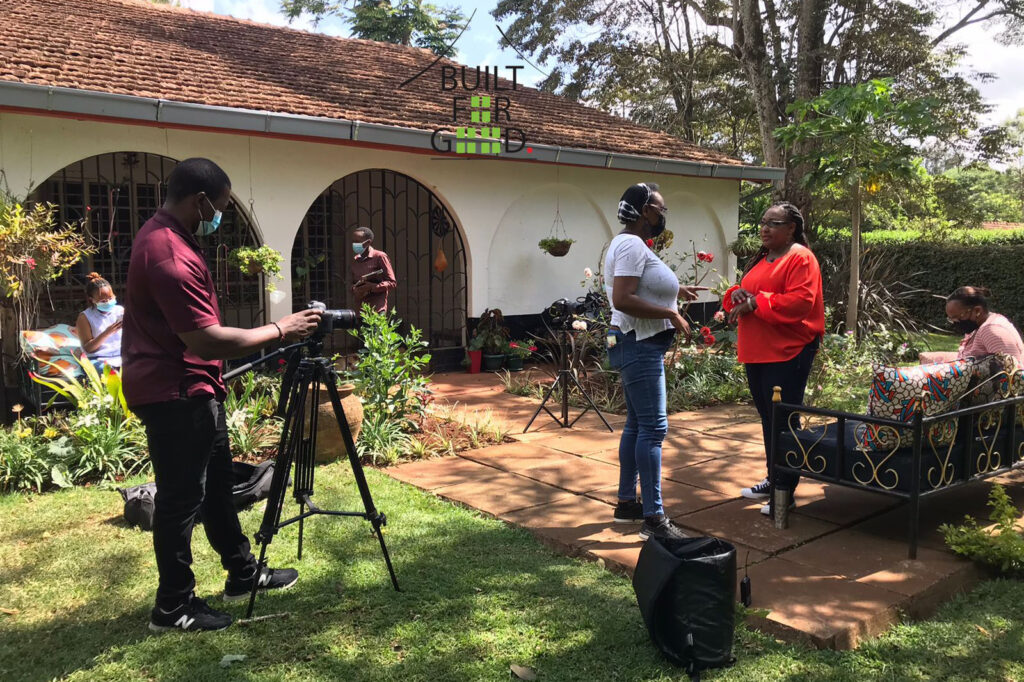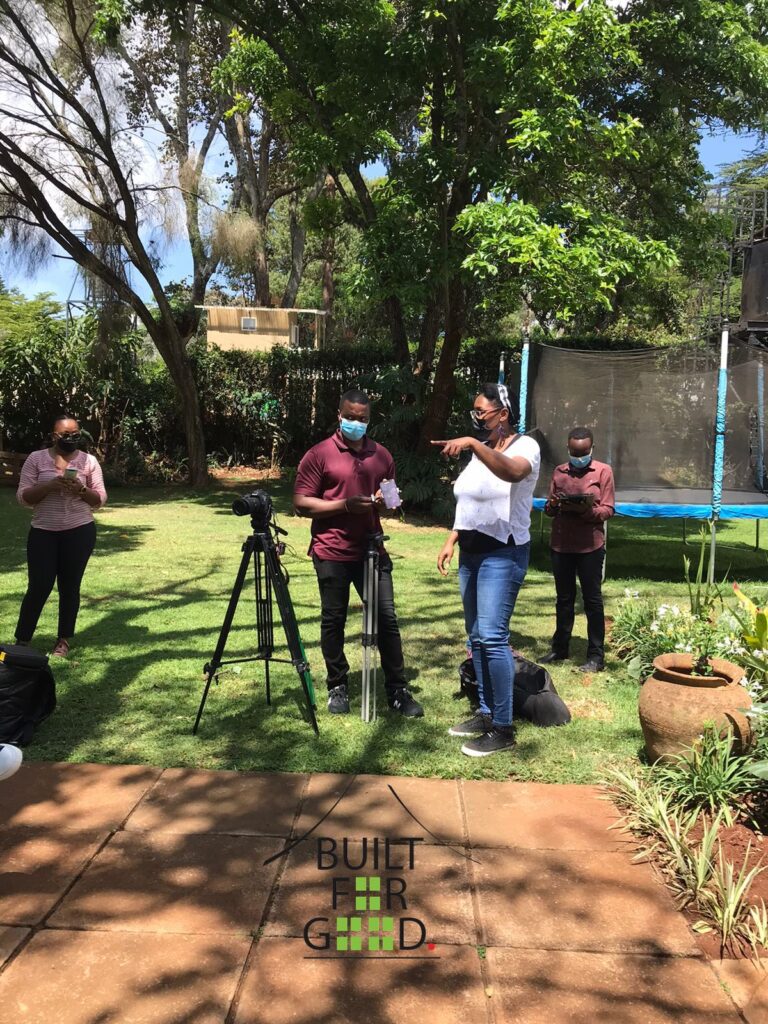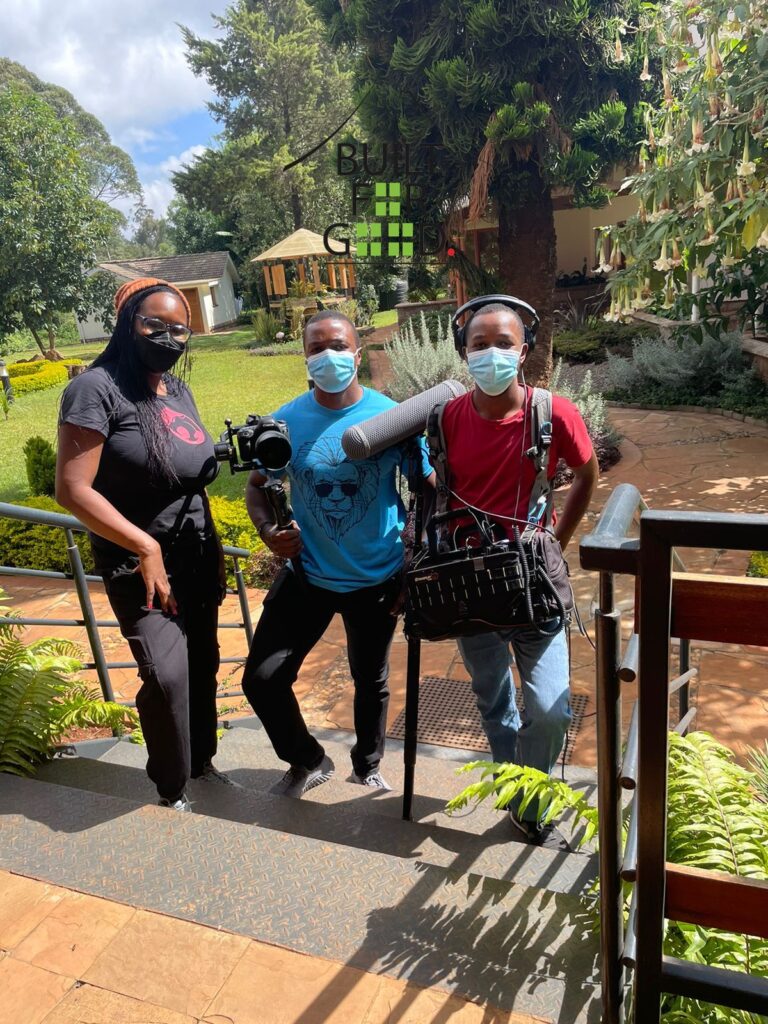In New Series, Wanjiru Njendu, MFA ’03 Highlights Green Building in Africa

When the COVID-19 pandemic hit two years ago, filmmaker and Emerson alumna Wanjiru Njendu, MFA ‘03 was just as taken aback as the rest of the world. Residing in Los Angeles at the time, the writer-director decided to head back to Kenya, where she grew up and where her sister, architect Mugure Njendu, lives.
As the uncertainty caused by the pandemic stretched from weeks to months to years, Mugure shared an idea she had with Wanjiru, and the sisters decided to use their talents to embark on an extraordinary project.
Together they began filming Built for Good Africa, a documentary series hosted on YouTube. The series, directed by Wanjiru, showcases green building projects, technologies, and architects, starting with a focus on Kenya and looking to expand to showcase green builds from all over Africa.
“Viewers will find this [series] that tells them that kids grew up in non-polluted classrooms,” said Wanjiru. “It comes back to the legacy I want to leave.”
The mission of the series is to demonstrate the ingenuity, impact, and affordability of green building practices. In doing so, the series highlights the efforts of green organizations throughout Africa that strive to fight against the ever-worsening climate change, which disproportionately affects areas on the African continent.
Mugure, a registered architect, hosts the series. With each episode, she brings insight and knowledge as an EDGE Expert, a green building rating tool developed by the IFC, a subsidiary of the World Bank Group.
In the first episode, Mugure explores the Mount Kenya Waldorf School, a not-for-profit independent school that focuses on cultivating children’s creative and practical skills with an integrated, holistic approach. The school is sustainably built and teaches children how to become environmental activists.
“The school really feels like you’re in a park,” said Mugure. “One of the things that people have misconceptions around, in terms of green buildings, is they have to be very complicated. But I tend to always say we’ve always been building green as Africans… and we can see it here [at the school].”

In the second episode of the series, Mugure explores the Bessotted Farmstay on the foothills of Mount Kenya, an eco-friendly lodge that emphasizes contributing back to the land with help from its guests. The farmstay is off the grid and serves farm-to-plate organic foods. Guests can plant trees or flowers, till the soil, and herd goats and sheep.
In the episode, Mugure also speaks with Elizabeth Wangechi Chege, vice chair of the World Green Building Council, an international not-for-profit organization dedicated to transforming the building industry towards sustainability. Future episodes of Built for Good Africa will explore more influential green building projects throughout the continent.
“Really, this is what we’re focused on,” said Mugure. “Telling stories that [going green] can be done, and it will be the benefit of the long run, as well as the environment.”
Growing up in Kenya, Wanjiru’s natural creativity was nurtured by her parents.
“Most people aren’t expecting an African kid to say that the film that influenced them was E.T., but it was,” said Wanjiru, who counts Steven Spielberg, Guillermo del Toro, Nancy Meyers, Ang Lee, and Tarsem Singh, among others, as some of her influences.
She graduated from the United States International University in Nairobi before earning a graduate degree in filmmaking from Emerson.
“I absolutely loved my time at Emerson,” Wanjiru said. “We are a bunch of weirdos and you feel nurtured, and if you’re a weirdo it’s the best place to be out of place while fitting in perfectly.”
Since graduating, she has gone on to enjoy a fruitful career writing and directing various short films, partaking in events for Women in Film, and working stints within the studio system for Disney and Universal Pictures, as well as being inducted into the Academy of Motion Picture Arts and Sciences.
Her film, Stray, which she directed and co-produced for Hulu’s Bite-Sized Halloween anthology (with a feature option), is a micro-short spin on the Pied Piper myth, which echoes the epidemic of missing Black children. Another award-winning short film, Boxed, focuses on the true story of Henry “Box” Brown, a 19th-century enslaved man who escaped bondage by mailing himself in a crate to abolitionists in Philadelphia. The film is available to watch on Vimeo on Demand, Tubi’s Black Power Series, and will be coming to the Comcast Xfinity app later in the summer.

“[With Boxed], we actually had to think inside the box,” said Wanjiru, reflecting on the unique technical obstacles of shooting the whole film with its lead inside a cramped crate.
Wanjiru cites Boxed as her make-or-break film, one which she invested the last of her funds into at the time. Since then, Boxed has enjoyed a successful festival run, with numerous nominations culminating in a curated selection for the Les Nuits en Or (Golden Nights) by the Académie des César.
Looking to the future, she has some exciting projects in the works, including a U.S. feature horror/thriller film in active development and a supernatural black magic fantasy series.
When it comes to advice she would have given her younger self at the start of her film journey, Wanjiru says it’s all about trust.
“I would have told her to trust herself more. I learned to trust my voice as a director [because] it’s easy to undermine yourself,” she said.
With some departing wisdom, Wanjiru shared some valuable self-care practices she utilizes.
“Adult coloring books are a must… My friends have sent me every Keanu Reeves adult coloring book there is. They are really helpful when it comes to relaxing or reducing anxiety while making something in another creative tone,” Wanjiru said. “Give yourself permission to rest… [Once a month] I take what is known as a sleep day where I just sleep the whole day and that’s it.”
Categories